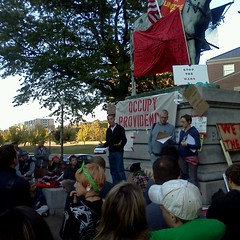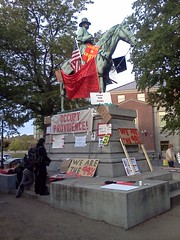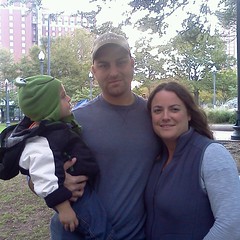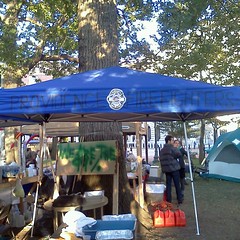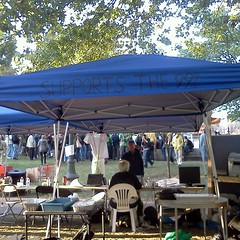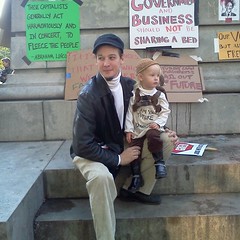Occupy Providence: “This is what an activist dreams about.”
17 Oct 2011I spent about an hour on Sunday afternoon at Occupy Providencein Burnside Park, interviewing occupiers, taking pictures, and trying to get a general sense of the tenor of the movement. I was motived by dissatisfaction with most of the reporting I’ve seen on the Occupy movement. The tendency seems to be to do some obligatory man-on-the-street interviews, and then turn the footage back over to in-studio talking heads to make points they were going to make anyway. In other words, Occupy is being used to reinforce existing narratives about politics, social issues, and class.
However, most social movements have compelling narratives of their own. Occupy is no exception. I encountered a multitude of viewpoints on a variety of issues. Perhaps most informative were the responses that Occupiers gave when I asked for their opinion on potential problemswith the movement. I decided to do this because I wanted to break the paradigm whereby protestors state goals and pundits critique them. I wanted to hear the movement’s critiques of itself: what might go wrong, what needs to happen to “succeed,” what “succeeding” will actually look like, and so on. I didn’t get answers to all of these questions, but I’m planning to go back, and hopefully to camp outfor at least a couple nights in the next few days as an embedded Occupier-journalist.
Here are some of the stories of the people I met today. All photos are mine, except where otherwise noted, and are available under a Creative Commons license (details).
Gretchen and Arrash Jaber: “More than just politics”
Gretchen didn’t specify her education level she’s currently employed full-time as a mother (the couple’s son was at the tent with them). When I asked why they were there, Gretchen told me she wanted to “be a part of making a change.” Arrash has a bachelor’s degree and is currently employed. He feels that the Occupy movement isn’t a purely political one he listed “cleaning up the city [Providence]” as one of the things he thought local Occupiers could organize around, in addition to some more hypothetical concepts like uniting globally with the working- and middle-classes.
In my experience, when a nonviolent demonstration begins to treat the police as its enemies, it immediately begins to lose both moral and practical high ground. During the hour or so I spent at Occupy Providence today, I saw Providence police officers engaged in friendly conversation with various organizers. Arrash put words on this phenomenon: he wanted the demonstrators to respect the police and to talk to them. I pointed out that the police are often part of the very same working class that liberal social movements commonly try to represent he agreed emphatically.
The Providence Fire Department has also lent material support to Occupy Providence they donated three tents, which were at the time of my visit being used for media. The fire department had even gone so far as to label one of the tents (click for larger images):
Jonathan Lewis: “This is what an activist dreams about.”
Jonathan is self-employed in nonviolence training. He’s the founder of the Positive Peace Warrior Network. After driving by Occupy Providence yesterday, he decided to return to camp out. I asked him about the way forward could Occupy’s success in physically bringing people together be translated into legislative action? Would the movement’s grassroots energy need to be sacrificed? He replied that it’s “not an either-or” that it’s about “displaying unity” between these two fronts. His enthusiasm for in-person organizing was balanced by this pragmatic approach to the messy process of electoral politics another good sign for Occupy as it progresses.
Kyla Coburn and Andy Trench: “Targeted change”
Kyla and Andy work together as interior designers. They’d just arrived at the park with their two children when I met them. Andy was largely on kid duty, so Kyla did most of the talking Andy said they shared the same brain anyway.
One of Kyla’s primary concerns was message clarity she believes it will be absolutely vital in order to move Democrats. She expressed a personal desire to see Occupy coalesce around a message of “targeted change” toward corruption, rather than descending into a fiasco of “shaking a stick at the haves from the have-nots.” As we talked, she repeatedly underscored that she wasn’t there in support of a platform of anti-capitalism, but one of anti-corruption. This stands in strong contradiction to claims made by conservative media figures implying (orexplicitly stating) that Occupy is a cover for socialists (gasp!) or something else equally scary and “un-American.”
I pressed Kyla on the details of message centralization. By what process should this be accomplished? At what level? She wants to see Occupy’s message unified nationally and articulated into ten points to be disseminated, and is concerned that Occupy’s potential, namely its grassroots nature and wide appeal, could also undermine it as the “Republican media” (she named Fox News in particular) use soundbites to discredit the movement as a whole.
In too many cases, movements become bifurcated as organizers attempt to control the message while members seek to retain individuality. The fact that the individual members of Occupy are concerned with this issue is a very good sign. If Occupy does begin to articulate a national platform, I hope that individual members of the movement will be as receptive as Kyla was hopeful.
I’ll wrap up with a quote from Andy Trench, which was echoed by Michael McCarthy, one of the main organizers of Occupy Providence:
People can’t take for granted that other people are going to do that work for them. They have to come down here and actually put that time in.
Occupy Providence is on Facebook and Twitter. Connect with them there for ongoing updates, and stay tuned here for more interviews, photos, and thoughts on the movement as a whole. I’ll also be tweeting during my camp-out in the park follow me on Twitter @renaissanceboy.
